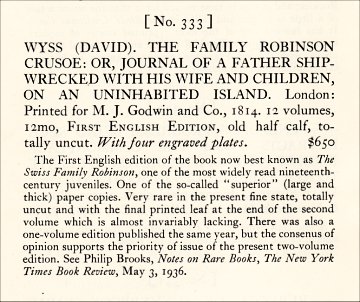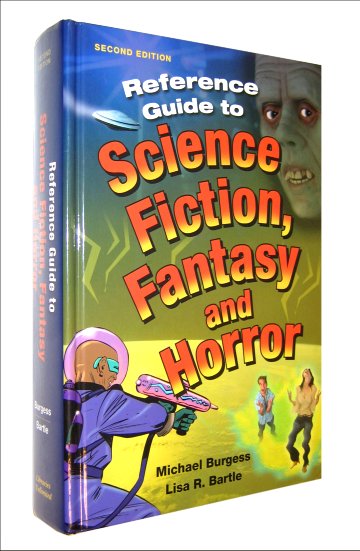

|
An IntroductionWe live in an age when most of us turn first to the internet for answers, and why not? The amount of information available seems both up-to-date and limitless - and accessing it is nearly instantaneous. How can libraries or even books themselves compete? Increasingly, they can't. An entire generation has been raised in an environment teeming with cell phones, iPods and Xboxes. Who wants to slog through a book anymore? Well, if you're a bookseller, perhaps you still do. Many of us choose to sell books because we love books, grew up with them. And yet I'd bet that most of you - and I include myself in this group - often turn first to the Internet for your answers too. It makes perfect sense to. But, if you're like me, I'd also bet that, when you can't find the answer you're looking for, there are times when it doesn't even occur to you to look in a book for it, even if that book is sitting on a shelf within arm's reach - and it's too bad because, as rich a resource as the internet is, there remains a massive storehouse of information that can be accessed nowhere else but between the covers of a book. A month or so ago, just out of curiosity, I purchased a ca. 1936 Scribner Book Store booklet on eBay titled First Editions of Juvenile Fiction: 1814-1924. Frankly, I had no idea what to expect, but I must say that I was pleasantly surprised when it arrived: It's a catalog of 333 juvenile (used) first editions then offered by the legendary store, complete with detailed, professionally accomplished descriptions and issue points. Here's the last entry:

Apparently these catalogs were published frequently, perhaps quarterly - the store opened in 1913, and my catalog is #107 - and more typically pertained to first editions generally, not just juvenile titles. It occurred to me that, if you were to assemble a representative collection of these, you'd have an excellent resource for first edition identification, and yet I've never seen one of these on an internet list of recommended books for booksellers. This isn't an isolated case. There are many, many books that offer superb bookselling information that simply can't be had online, but even if you stumbled over one of these at a library or bookstore or wherever - how would you know whether it was worth buying or not? Well, here's where Libraries Unlimited comes in. LU publishes books that help librarians decide which books to put on their shelves; and in many cases these books can also help you decide which books to put on your shelves as well. Suppose, for example, you were interested in specializing in Science Fiction, Fantasy and Horror and starting pretty much from first base. You'd definitely need some reference books to help you acquire knowledge of the high spots in the genre. You'd also need something that would help you identify first editions, and if you intended to specialize in specific authors or sub-genres, you'd need bibliographies pertaining to them, and so on. Certainly you could email BookThink's Science Fiction Editor Tim Doyle, and I'm sure you'd receive some excellent advice on what to buy first and perhaps a short list of essential references. But as good as Tim is, I also know that you wouldn't receive a list of 705 Science Fiction, Fantasy and Horror references with exceptionally detailed reviews of each and every one of them. And yet that's exactly what you would get if you purchased this Libraries Unlimited book:

>>>>> Article continues on next page >>>>>
Questions or comments?
| Forum
| Store
| Publications
| BookLinks
| BookSearch
| BookTopics
| Archives
| Advertise
| AboutUs
| ContactUs
| Search Site
| Site Map
| Google Site Map
Store - Specials
| BookHunt
| BookShelf
| Gold Edition & BookThink's Quarterly Market Report
| DomainsForSale
| BookThinker newsletter - free
Copyright 2003-2011 by BookThink LLC
|

|
|